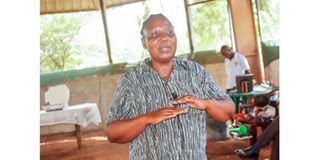Treat for grannies like no other: Tharaka CBO leads the way

Ms Catherine Kareaekwa, Tharaka Green Gold CBO coordinator, on March 17, 2022. The organisation holds three-day retreats for the elderly.
What you need to know:
- The women, aged over 70, gather to be pampered and given a treat by younger women who are members of Tharaka Green Gold, a CBO.
- Tharaka Green Gold brings together women who do weaving and crocheting, as well as value addition to local produce for the local and export market.
A group of grannies, some in their 100s, form a circle under a makuti shelter in the scorching sun of Marimanti in Tharaka Nithi, before breaking into song and dance.
As the soloist belts out a tune of Mboboi, a traditional celebratory dance, the room comes to life as two grannies enter the circle with aggressive and inviting moves, breathing life into the saying that ‘age is just a number’.
We are at the home of Ms Catherine Kareaikwa, the coordinator of Tharaka Green Gold, a community-based organisation (CBO), on the outskirts of Marimanti town, where at least 30 elderly women are gathered for a three-day treat.
Here, it is all about love, laughter, lessons, song and dance—nothing but lots of fun and play.
Ms Kareaikwa tells me that the women, aged over 70, gather here to be pampered and given a treat by younger women, who are members of the CBO.
Tharaka Green Gold brings together women who do weaving and crocheting, as well as value addition to local produce for the local and export market.
“Some two years ago, we realised that there was a high number of ageing members in our group who could no longer participate in our activities. These elderly members were being left out by the day because they could not come for meetings. This is when the idea of holding retreats for the aged was born,” Ms Kareaikwa says.
In need of care
The group has more than 40 members who have clocked more than 70 years and are in need of close attention. Members and well-wishers contribute food and other items for the three-day retreat where the elderly also get medical, spiritual and psychological support.
“We use this occasion to take care of them. We wash them, feed them, counsel them and advise them on how to age gracefully and peacefully. They sing and dance, tell stories and play together. We bring in nutritionists, health experts and spiritual leaders to talk to them,” she says.
Ms Kareaekwa notes that the majority of old people have been neglected and end up deteriorating in health and mentally as they age.
This is affirmed by a 2017 report on institutions of the elderly in Kenya by the National Gender and Equality Commission (NGEC), that states that old people suffer weakening health, illnesses and conditions associated with ageing, poverty, neglect and abandonment by their families, loneliness and insecurity.
“The spiritual leaders focus on guiding them to resolve and avoid conflicts in the family. Some old people end up cursing their children because of the bitterness of being neglected or mistreated. It is very important that they leave their families in peace,” she says.
Stipends alone not enough
She notes that despite the government initiative to give a stipend to the elderly, there is also a need to address the social problems that come with age.
“The old people have various problems, apart from lack of money. There is a need for government-led programmes to address the neglect and loneliness that has come with modern society,” the coordinator says.
Ms Hellena Gakunyi, 70, says the retreats are life-changing for most of them who live alone as children go to work.
“This is a very exciting experience. We go home refreshed, healthy and happy. This is a challenge to the younger generation to take care of the old people. There is a lot of wisdom in the elderly that the young people can also tap from when they stay with them,” Ms Gakunyi said.
Self-worth
According to Ms Leticia Nthiga, one of the facilitators of the programme, aged people who have been neglected need a lot of reassurance to regain a sense of self-worth.
“Many old people suffer from depression and bitterness because of loneliness. At that age when their partners have long passed on, they, too, wish that they were dead, but we remind them that old is gold. We make them feel appreciated. The change of attitude helps improve their health,” Ms Nthiga said.
Mr Julius Mutugi, a resident, urged families and community to sacrifice time and resources to take care of the elderly to enable them to live longer. He noted that the work culture has extensively denied families time to be with their old relatives.
Mr Kareaekwa noted that the programme has led to improved quality of life among its elderly members compared to the past.
In its report, NGEC recommended the development of legislation to protect the rights of the elderly, including the responsibilities of families, and called for establishment of homes in every county to take care of the older population.
According to the 2019 population and housing census, more than 1.8 million persons aged over 65 years account for 3.9 per cent of the total population.





